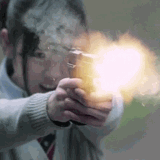I hope so. And I hope that people in the entertainment industry (and in everyday life) come to fully understand that it's really not safe to treat helium inhalation like a risk-free game.
It's strange, too, because with just about all of the other non-air things that you can put in your lungs (smoke, smog, ether, solvent fumes, gasoline, coal and asbestos dust, nitrous oxide, carbon monoxide, etc.), even people who consciously choose to be exposed to them (like smokers) are aware that there are risks, and maybe serious ones. But with helium, it seems like too many people think, "Well it makes you talk like a duck at parties, so it must be safe!"
6th Station ~Other Bands for H!P Fans~
Moderator: Moh
Re: 6th Station ~Other Bands for H!P Fans~
If madness made us strong, we would all be invincible.
-

TotallyUncool - #Member
- Posts: 2320
- Joined: Mon Oct 29, 2007 4:16 pm
- Location: Gaslighting myself, but then again, I would do that, wouldn't I?
- Has thanked: 971 times
- Been thanked: 682 times
- Favorite Idol: Siao Fongfong '66
Re: 6th Station ~Other Bands for H!P Fans~
We don't really see helium as dangerous. For some reason we just kinda forget it's risky because it's helium! But all gases are dangerous, hell even oxygen is dangerous.
-

AyuHikaru - Devotee
- Posts: 4364
- Joined: Fri Oct 24, 2008 1:58 am
- Location: 10th Gen's Biggest Supporter!
- Has thanked: 123 times
- Been thanked: 883 times
- Favorite Idol: Harunan, Murotan
Re: 6th Station ~Other Bands for H!P Fans~
the girl may be suffering from a cerebral air embolism
Jfc, that's awful. How could anybody think that was a good idea?
-

Moh - Prophet
- Posts: 5191
- Joined: Wed Oct 22, 2008 10:45 am
- Location: AMABALA | she/her
- Has thanked: 166 times
- Been thanked: 1117 times
- Favorite Idol: 鈴木愛理・段原瑠々・島倉りか・北原もも
Re: 6th Station ~Other Bands for H!P Fans~
They're saying she's in a coma now. I know I honestly had no idea that helium was so dangerous. I know that something are unforeseeable but you'd think they would do stunts like this with the utmost caution. Really scary.
I used to have a Tumblr about Idols...
-

DSQueenie - Acolyte
- Posts: 650
- Joined: Thu Oct 27, 2011 10:22 pm
- Has thanked: 334 times
- Been thanked: 75 times
Re: 6th Station ~Other Bands for H!P Fans~
Here's some info from an unrelated but similar accident which explains the risks pretty well:
TL;DR is that it can be dangerous but deaths are extremely rare, a lot rarer than from say parachuting, rock climbing, or eating peanuts. Around the same order of magnitude as deaths from fugu consumption. If you're going to do it, inhale from an inflated balloon, not directly from the gas tank.
Spoiler: show
TL;DR is that it can be dangerous but deaths are extremely rare, a lot rarer than from say parachuting, rock climbing, or eating peanuts. Around the same order of magnitude as deaths from fugu consumption. If you're going to do it, inhale from an inflated balloon, not directly from the gas tank.
tending to put ~ on song titles since 2002
-

Zunu - Pantaloon
- Posts: 8250
- Joined: Tue May 06, 2008 6:09 am
- Location: DANGER ZONE
- Has thanked: 4100 times
- Been thanked: 2730 times
- Favorite Idol: 谷本安美
Re: 6th Station ~Other Bands for H!P Fans~
Helium isn't a renewable resource either. Once it's gone it won't come back. I wish people wouldn't use it like it's like water. Which can also be dangerous in large amounts. You can get hurt from the most innocent of things you know. I really hope this girl pulls through. Any update on her?
-

Shoujo Q - Devotee
- Posts: 3289
- Joined: Fri Aug 31, 2012 11:34 am
- Location: Massachusetts
- Has thanked: 92 times
- Been thanked: 996 times
- Favorite Idol: Suzuki Airi
Re: 6th Station ~Other Bands for H!P Fans~
So, funk music is making a comeback, largely thanks to a white nerd from England. Huh.
- Celedam
- Devoted Devotee
- Posts: 12481
- Joined: Thu May 26, 2011 6:12 am
- Location: Tree Town, USA
- Has thanked: 1424 times
- Been thanked: 2515 times
Re: 6th Station ~Other Bands for H!P Fans~
Ariana Grande's grammy performance was pretty.
- Amped
- 一万感謝の神
- Posts: 61931
- Joined: Tue Oct 07, 2008 12:19 pm
- Has thanked: 2822 times
- Been thanked: 10102 times
Re: 6th Station ~Other Bands for H!P Fans~
On my phone now so can't post much, but there are more Babymetal concerts abroad coming up.
Too bad my sister has to have her freakin' PhD graduation ceremony during the Chicago date (May 14th).
edit: info on their page
http://www.babymetal.jp/
I'm happy they're coming to Chicago AND Columbus. Expansion into the Midwest is good.
Too bad my sister has to have her freakin' PhD graduation ceremony during the Chicago date (May 14th).
edit: info on their page
http://www.babymetal.jp/
I'm happy they're coming to Chicago AND Columbus. Expansion into the Midwest is good.
-

esm - Member
- Posts: 2512
- Joined: Sat Sep 22, 2007 11:27 pm
- Has thanked: 390 times
- Been thanked: 672 times
- Favorite Idol: Reina, Eripon, Nakky
Re: 6th Station ~Other Bands for H!P Fans~
esm wrote:On my phone now so can't post much, but there are more Babymetal concerts abroad coming up.

May 09 — Mexico City
May 12 — Toronto, Ont.
May 14 — Chicago, IL
May 16 — Columbus, OH
May 29–31 — Nürburg, Germany (exact date TBA)
May 29–31 — Munich, Germany (exact date TBA)
June 04–06 — Vienna, Austria (exact date TBA)
June 21 — Chiba, Japan
http://babymetal.com/babymetal-world-tour-2015-dates-announced-part-1/
Wow, three dates near me, all pretty much equidistant, east, west, and south. I did not expect that. What to do…
Columbus would be nice, because it's a Saturday and I can drive there, but it's a festival and festivals suck. Chicago would mean taking vacation days, riding the train, and spending serious money to stay downtown, but the House of Blues is a good venue.
I need to think about this.
Last edited by Celedam on Tue Feb 10, 2015 4:29 am, edited 2 times in total.
- Celedam
- Devoted Devotee
- Posts: 12481
- Joined: Thu May 26, 2011 6:12 am
- Location: Tree Town, USA
- Has thanked: 1424 times
- Been thanked: 2515 times
Who is online
Users browsing this forum: Bing [Bot] and 54 guests
